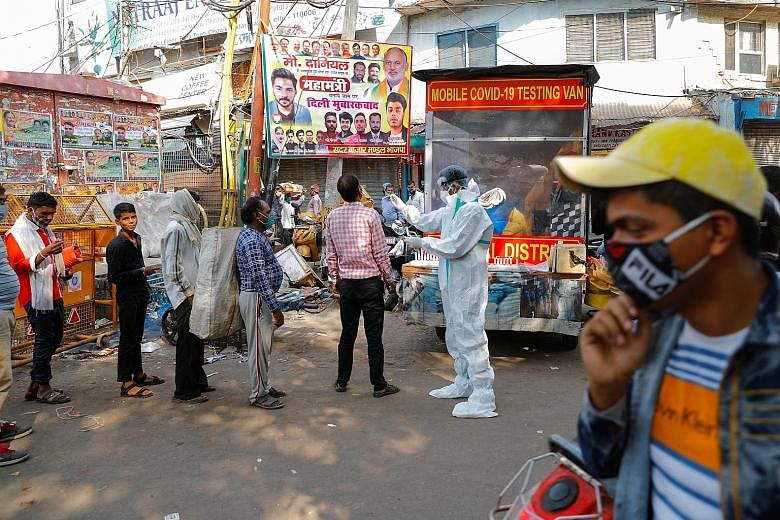The Indian capital is in the grip of a third and more intense wave of the Covid-19 pandemic.
Hundreds of doctors and paramedical personnel are being flown into the city, hospitals are adding beds and medical teams are fanning out to conduct house-to-house surveys as the authorities try to contain the situation with emergency measures.
New Delhi registered 3,797 new cases on Monday, the highest number in the country, and the figure was a sharp jump from that at the beginning of October when fewer than 2,000 cases were recorded.
The number of new infections, however, was down from 7,000 last week although the fall was attributed largely to the drop in testing over the past three days in the capital and elsewhere due to an extended holiday weekend.
Still, the overall downward trend around the country is continuing, with 29,163 cases recorded on Monday - a four-month low.
Epidemiologist Shahid Jameel, in explaining the disparity, noted that the impact of the coronavirus in India, with its vast size and population, was not uniform.
"Ups and downs will continue to take place in different places at different times," he said.
An official in the Ministry of Home Affairs said that 75 doctors and 250 paramedics are being dispatched to the capital in batches. The doctors began arriving on Monday and will be in place over the next two to three days while the paramedics will be deployed within a week.
The official said 10 multi-disciplinary teams, consisting of officials from the health ministry, All India Institute of Medical Sciences and home ministry, were visiting 115 private hospitals in Delhi to look at bed utilisation and testing capacity and to scope for additional intensive care unit (ICU) beds.
Yesterday, the Delhi state government reversed a decision to allow 200 people to attend wedding receptions, cutting that number down to 50. It is also considering closing markets where social distancing is not being followed.
"We will send a proposal to the central government requesting them to allow us to temporarily close those markets where we see rampant violation of social distancing norms and Covid-19 regulations, which we assess as potential hot spots," said Delhi Chief Minister Arvind Kejriwal in a video message.
Delhi, which has a population of more than 19.8 million people, has struggled to control the pandemic. It has registered a total of over 489,000 cases and a death toll of 7,713.
Experts blame several factors for the city's predicament.
Delhi is a melting pot with different communities, leading to prolonged festive celebrations compared to other parts of the country. The festivities range from Deepavali or Diwali, the Festival of Lights, to Karwa Chauth, a north Indian festival celebrated by women for the well-being of their husbands.
Such celebrations usually mean crowds will throng markets.
Another factor seems tied to the city's dubious distinction as one of the most polluted cities in the world. The annual spike in air pollution occurs every winter due to the burning of stubble by farmers to clear land in neighbouring states. The ensuing pollution adds to the smog caused by vehicles and factories in the congested city.
Several international studies have established a correlation between pollution and the mortality rate from Covid-19. Delhi's air quality remained in the unhealthy range yesterday.
Experts say there is also "Covid fatigue" among the population, with lax attitudes towards the wearing of masks as rules on social distancing are loosened amid a return to life in pre-Covid-19 days with regard to going to work, travelling on public transport, socialising and shopping.
Dr Vivek Nangia, an interventional pulmonologist and principal director and head of Max Super Speciality Hospital, warned that the situation in Delhi was dire.
"The hospitals are already packed. In the earlier (waves), only ICU beds were full and other beds were available," he said.
He added that healthcare professionals in the city were exhausted.
"This time, we have seen a younger crowd in their 30s and 40s coming in. Earlier, it was the elderly and those with comorbidities. It is because these younger people are moving around.
"I think the main advice is that we should restrict our movements to a bare minimum. We should consider a self lockdown, especially those who are vulnerable," said Dr Nangia.
Delhi Health Minister Satyendar Jain believes the peak of the third phase for Covid-19 infections is over but experts disagree, saying that the impact of the recent festive season will be apparent over the next two weeks.
-
489,000
-
Number of Covid-19 cases in Delhi.
7,713
Number of deaths.












